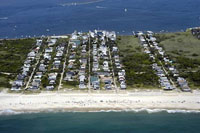U. S. Senator Kirsten
Gillibrand attends dedication of
Cherry Grove Theater and
Community House on inclusion in The National Register
Cherry Grove, NY –– The junior
Senator from NY, Kirsten Gillibrand (D), took the time to come to Cherry Grove
and see the Community House Theater after it was selected to the National
Historic Register for being the oldest continuously operating LGBT theater in
the country.

Photos by Denise Dell Harbin
There was a ceremony with all
residents invited where the Senator and Diane Romano, as President of The
Cherry Grove Community Association (CGCAI) and Thom “Panzi” Hansen, as
President of The Arts Project Cherry Grove, all spoke, followed by a champagne
toast.

Grove resident Allan Payne also
spoke, as a representative of the National Parks and detailed how the selection
happened. It was due in large part to the diligent work of Grove resident
Carl Luss, whose research culminated in a 92 page proposal that the Community
House receive the prestigious award of the landmark status. This status will
then allow the CGCAI and APCG to apply for more grants to raise the money
needed to restore the house. The community has also been doing a wonderful job
of raising funds for the estimated million dollars needed to save and then improve
the Community House.
Gillibrand took over the seat
of the junior Senator from NY when Hilary Clinton was tapped as Secretary of
State. Gillibrand had worked on Clinton ’s campaign and they became friendly.
Although Clinton is expected to run for President in 2016, there is some buzz
that if Clinton declines, Gillibrand may run! She simply says she is supporting
Hillary.
Senator Gillibrand campaigned
for the designation of landmark status for the Community House for years and
seemed very pleased that it came to fruition. She looked at Thom Hansen and
said “we want to assure there will always be a place for Panzi’s antics”. We
wish she had stayed to see some of what we do in the Community House beyond
Panzi’s antics! That very night, Ocean Aires played their classical music
concert for the 15th year, and even introduced a new song written just for our
community, We built our house on Shining Sand, by Seth Bedford
At the urging of U. S.
Senator Kirsten Gillibrand (D-NY), the Cherry Grove Community House and Theater
have been added to the National of Historic Places. The structure, built in
1948 and then floated over to its current site on Bayview Walk, was singled out
by Gillibrand for its critical role in the history of the gay liberation
movement in America .
According to the National Park Service
website, the 65 year old building was eligible under Criterion A in the areas
of Social History, Performing Arts, and Community Planning and Development. The
Community House and Theatre is exceptionally significant in social history for
the enormous role it played in shaping what gradually evolved into "
America ’s First Gay and Lesbian Town ."
A press release from the
Senator’s office reads:
"Washington, D.C. - U.S.
Senator Kirsten Gillibrand (D-NY) announced today that the U.S. Department of
the Interior’s National Park Service placed Cherry Grove Community House and
Theater on the National Register of Historic Places. Last month, Senator
Gillibrand urged the Chief of the National Register of Historic Places and
National Historic Landmarks Program to designate the Fire Island site on the
official list of the country’s historic places worthy of preservation. Located
on Fire Island , this historic site provided one of the first settings for
collective gay identity to openly appear in our nation’s history.”
(The Cherry Grove) Community
House and Theater represents the first civic entity to integrate gay and
lesbian interests into governance and social life said Senator Gillibrand.
"I am thrilled that this historic site, the first civil rights
organization for the LGBT community, is finally acknowledged for their
contributions."
"We are overjoyed that
the nation is recognizing this powerful symbol of civil liberties for the LGBT
community," said Diane Romano, President of the Cherry Grove Community
Association. "This is a great honor and a thrill and we are so grateful to
everyone who played a role in achieving this historic milestone."
At the time of the Community
House and Theater’s establishment in 1948, it was headquartered as the Cherry
Grove Property Owners Association, and there weren’t civil rights organization
specifically dedicated to the advocacy of LGBT Rights. In 1948, the Cherry
Grove Community House played a major role in the development of gay performing
arts and initiated the first American venue to feature productions by gay
people for gay and straight audiences.
The Cherry Grove site
contributes to a greater understanding of civil rights movements as an
evolutionary process towards change and represents a rare and exceptionally
significant chapter in the struggle for gay and lesbian civil rights in the
United States today."
The National Register of
Historic Places is the official list of the Nation’s historic places worthy of
preservation. Authorized by the National Historic Preservation Act of 1966, the
National Park Service’s National Register of Historic Places is part of a
national program to coordinate and support public and private efforts to
identify, evaluate, and protect America ’s historic and archeological
resources.
Senator Gillibrand called for
all Cherry Grove to celebrate. Our building and our town is an icon for
creativity. Panzi noted that the Senator “is the highest ranking official to
visit Cherry Grove, no matter who you all thought you were when you got here”.
We were dismayed to see that the Senator arrived by private boat from The
Pines, but it’s her weekend! She makes us feel almost mainstream! Look for the
plaques on the building soon!
Denise
Dell Harbin, Publisher
violet.letter@yahoo.com
631.597.7208
Senator Gillibrand’s remarks
from Cherry Grove press conference.
I’m so excited to be here with
you all today in Cherry Grove.
We wouldn’t be celebrating here
today if it weren’t for people like Diane, Joyce, Thom and all of the members
of the Cherry Grove Community Association and the Arts Project of Cherry Grove.
Their tireless efforts have paid off and I am thrilled to share this momentous
occasion with them.
We’re here celebrating the
Cherry Grove Community House and Theater because it stands for something unique
in our journey as a nation, an icon in LGBT history that chronicles the
often-difficult road that so many gay men and lesbians traveled over the last
70 years.
The Cherry Grove Community
House represents one of the first civic entities to integrate gay and lesbian
interests into governance and social life. For 70 years, this house has stood
at the heart of Cherry Grove, an icon of creativity and artistic expression, a
gathering place for community of men and women who stood together, and a
treasure trove of memories. An icon in an iconic community.
I was proud to lend my voice to
yours in calling for Federal historic designation for such a special
place. And I look forward to working with you all to take this to the
next step as the Community House explores applying for Federal Historic
Landmark status – the highest Federal landmark status attainable!
And now I would like to unveil
and present these historic markers so that residents and visitors can
appreciate the significance of this site for years to come….
Diane, please join me.
From Carl Luss:
I had no idea what I was
getting into when I pitched the Community House and Theater to the New
York State Parks, Recreation and Historic Preservation group in Albany one year
ago this Labor Day. The Cherry Grove Community Association has been
represented for over 15 years by my law firm where I am a secretary/legal
assistant. CGCAI asked the firm to assist it in locating and applying for
state and federal grants to renovate the community house. In that
context, the legal staff asked, "Is Cherry Grove historic?"
We knew the Grove was one of the first settled communities on Fire
Island , and that Harold Seeley--for many years the set designer of the Arts
Project of Cherry Grove--had accumulated memorabilia for the early Grove
years.
Last August, the Arts Project
presented one of its semi-annual Archive Shows. With the word
"historic" in my head, I took a fresh look at familiar objects from
past shows. An original program The Cherry Grove Follies of 1948
was colorful and "old," so I opened it. I was shocked to
read among the listed advisory committee to the 1948 Follies names
associate with the American theater; Cheryl Crawford (arguably one of the
20thC's most successful Broadway producers--male or female (Brigadoon, One
Touch of Venus), Frank Carrington, founder of New Jersey's Paper Mill
Playhouse, George Freedley (the Art Project Committee's director) and as I
learned the founder of the Theater Library (now known as the Billy
Rose Theatre Collection at Lincoln Center) of the New York Public
Library among other luminaries from the New York City's legitimate theater.
Armed with this scant
information and some of the earliest images (1949) of a drag performance on the
Grove stage, I pitched the site to the NYS Parks as a possible LGBT-specific
historic site nominee. Once the first draft outlines of the site's
historic narrative took shape, the NYS Parks historic analysts erupted with
enthusiastic encouragement, confirming that the site would not only be accepted
as a nominee in NYS, but would be forwarded to National Parks Service, U.S.
Dept of the Interior in Washington, D.C., as a nominee to the National Register
of Historic Places. On June 4, 2013 we were listed on the National Register,
one of only three LGBT-specific National Historic Places in the United States .
The Stonewall Inn in Greenwich Village , NY and also this year, the Frank
Kameny House in Washington , D.C. (Kameny, with his partner, Jack Nichols,
co-founded in 1960 of the east coast Mattachine Society.)
All three sites are nationally
significant for their contributions to the advancement of civil rights and
equality for LGBT peoples.
The National Register's
published version of the Community House and Theater's application
is available on-line at http://www.nps.gov/nr/ as
an Adobe .pdf document:
http://www.nps.gov/history/nr/feature/places/pdfs/13000373.pdf
(Warning: it's over 90 pages/the last 30 color/B&W period images that can be
reprinted in your article with appropriate credits included.)
National Register of Historic Places Program
The National Register of Historic Places is the official list of
the Nation's historic places worthy of preservation. Authorized by the National
Historic Preservation Act of 1966, the National Park Service's National
Register of Historic Places is part of a national program to coordinate and
support public and private efforts to identify, evaluate, and protect America's
historic and archeological resources.
|
Property Name
|
Cherry Grove Community House & Theater
|
|
Reference Number
|
13000373
|
|
State
|
New York
|
|
County
|
Suffolk
|
|
Town
|
Cherry Grove
|
|
Street Address
|
180 Bayview Walk
|
|
Multiple Property Submission Name
|
|
|
Status
|
Listed 6/4/2013
|
The Cherry Grove Community
House and Theatre on Fire Island is eligible for the National Register under
Criterion A in the areas of Social History, Performing Arts, and Community Planning
and Development. The Community House and Theatre is exceptionally significant
in social history for the enormous role it played in shaping what gradually
evolved into America 's First Gay and Lesbian Town . Located in the hamlet of
Cherry Grove on Fire Island, the building was floated across Long Island's
Great South Bay to serve as the community house for the Cherry Grove Property
Owners Association, Inc., which organized in 1944 to serve this small, beach
colony's civic needs. In 1948, a theater addition was constructed, completing
the building seen today. As an organization, the association influenced the
community's development, facilitating gradual social acceptance,
self-affirmation, and integration of its gay and lesbian residents into Cherry
Grove's governing affairs and civic life. This integration of homosexual
residents into daily life and events at its community house afforded Cherry
Grove a singular status; it became the one of the first and, for many years,
the only gay and lesbian influenced geography in the United States . Its
metamorphosis played out against turbulent social and political upheavals --
our nation's response to the pre- and early days of the homosexual liberation
movement. The 1969 uprising at the Stonewall Inn, which is largely credited as
the turning point in the gay civil rights movement, has been documented by
numerous scholars. For the purposes of the National Register program, a
thorough discussion of the events leading to the riots and its impact can be
found in the 1999 Stonewall National Register nomination and its subsequent
National Historic Landmark designation report. The nomination of the Cherry
Grove Community House and Theatre is especially significant because it offers
the rare opportunity to document an entire GLBT community in the pre-Stonewall
era.











